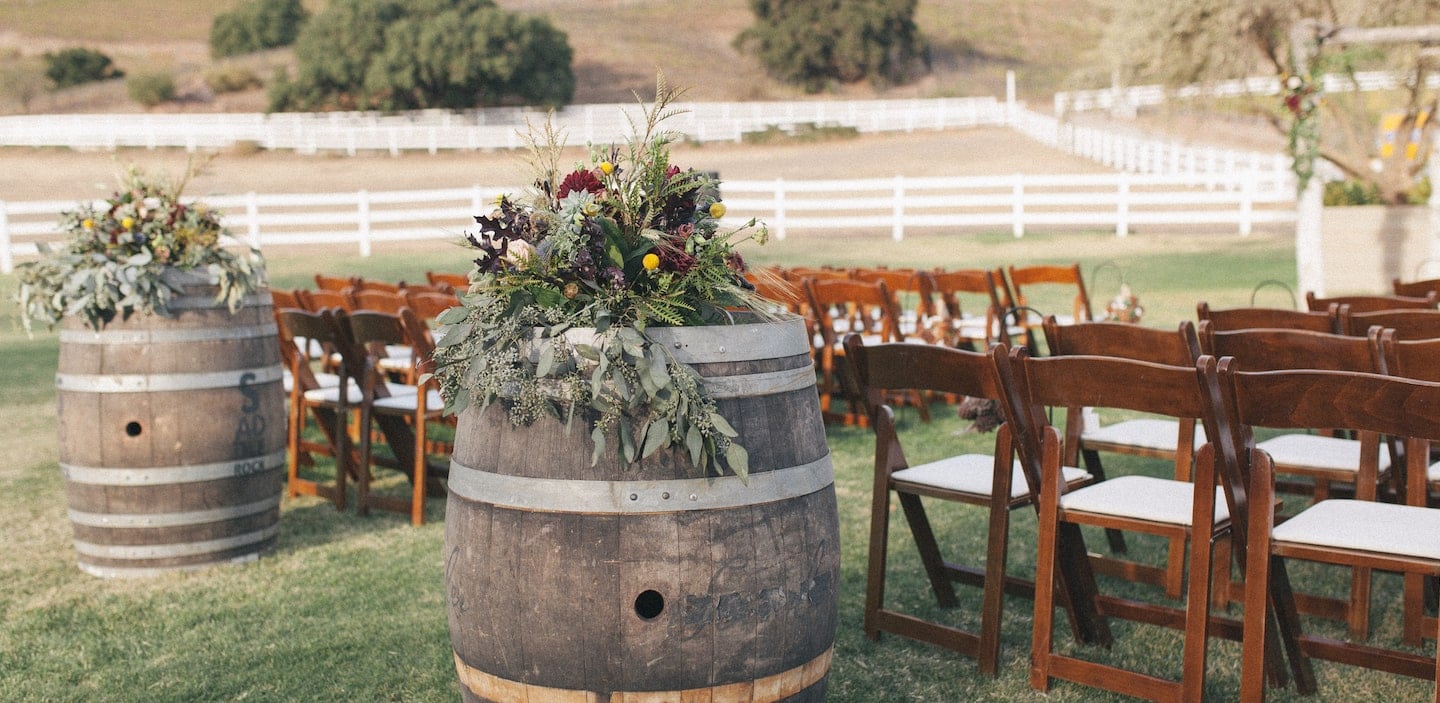Whether you’re planning the next great outdoor festival or your company potluck, there is one goal all event planners have in common — make it a success! But with so many details to track, it’s easy to see how an event can go off the rails. That’s why it’s crucial to have an event planning checklist to keep things on track.
As the event planner, you are responsible for everything from the guest list to liquor licenses to balloon colors. You don’t have room to overlook a single detail. However, even the most carefully planned events have a few bumps. The key to success is to have a plan to address these issues before they implode.
Our checklist will help you through every step, from pre-event to setup to post-event to-dos. While every event is different, this list is an excellent place to start your party planning journey.
Pre-event planning checklist
Establish event goals
To have a successful event, you first need to establish your event goals. After all, a corporate retreat and a weekend wedding have very different agendas. The intent may be to celebrate a special occasion, fundraise for a charity, recruit new hires or launch a product. Once you have a clear goal, you can plan an event around it.
Develop a master plan
Stay organized through every event planning stage by developing a master plan. Your master plan will outline the steps and items needed to meet your event goal. Here are a few basics:
- Dates — Include the date of your event and important deadlines for launching ticket sales, securing vendors and buying supplies.
- Location — Select a venue location that meets your requirements.
- Guest count — Determine the number of guests who will be in attendance.
- Theme and design – Create a mood board to inspire and communicate a clear vision.
- Communication — Determine the best methods of communication for attendees and staff.
- Budget — Create a detailed and realistic budget for the scale of your event.
- Sponsors and partners — Secure sponsors and industry partners to fund and promote your event.
- Staff and vendor contacts — Log all necessary contact information in one convenient location.
- Marketing plan — Develop a marketing plan to spread the word.
- Shopping checklists — Create shopping lists to stock your event with the essentials.
Set a budget
Before you can start searching for vendors, scouting venues and shopping for decor, you need to set a realistic budget. Determine your budget for early deposits, payment plans and final balances. If you are planning an event for the first time, do your research to learn the going rate for necessary items in your area. Once you have your budget set, you can:
- Search for in-budget venues
- Get bids from vendors
- Make deposits to secure your dates
- Begin processing payment agreements
Choose a venue
Choosing a venue can be fun and exciting, but don’t let the beauty of a space distract from the goals of your event. When selecting a location, properly vet it with these critical components:
- Capacity — What is the maximum capacity of your venue? Ensure that you won’t max it out between vendors, event attendees, security and last-minute RSVPs. Otherwise, you may void your insurance policy.
- Rain location — If your event is outdoors, secure a rain location in the event of severe weather. Make sure you understand how a change in venue affects your contracts, deposits and liability.
- Emergency plan — Develop an evacuation plan in case of an emergency. Create clearly marked exit signage, and save local emergency numbers on your phone.
- Transportation and parking — Ensure your venue selection has enough parking and easy transportation access for your guests. If you’re hiring buses, golf carts or other vehicles, confirm the transportation company carries adequate insurance. Clearly label the parking lot to avoid confusion, and verify your event insurance covers the premises.
Select vendors and entertainment
Event vendors and entertainment can make or break your party. So not only do you need to secure tasty food and outstanding performances, but you also need to use your judgment to select trustworthy and responsible vendors who will show up on time and deliver. Here are a few key vendors to keep in mind for your event:
- Food and beverage — Alert your food and beverage vendors of any guest dietary restrictions or allergies. Select vendors who carry general liability insurance to help reduce your liability for spills and tumbles.
- Security — While security is less exciting than an open bar, keeping your event orderly and safe is necessary. So don’t overlook this essential vendor!
- Audio and video — If the venue does not provide an AV team, contract with a reliable vendor. Ensure they have a backup plan in case of Wi-Fi issues, electrical outages or faulty equipment.
- Photographers — You’ve put in a lot of work to make your event picture perfect. So, hire a team of photographers to capture the magic! A wedding needs pictures to preserve memories, but photos are also a great asset to promote future corporate and fundraising events.
- Entertainment — There are many entertainment options for your event, including singers, comics and even magicians. Depending on the talent, you may need to prepare for expenses to cover travel, hotels, dressing rooms or backup performers.
Market the event
You can plan the event of the year, but without the proper marketing, no one will be there. Develop a marketing schedule to complement your event planning checklist. Make sure attendees have plenty of notice, especially for larger events. Here are a few ways to get the word out about your event:
- Create an event website
- Send paper or email invitations
- Make social media pages
- Develop an event hashtag
- Enlist the help of influencer marketing
Safeguard the health and safety of guests
You know what they say — what can go wrong, will go wrong. A successful (and safe) event hinges on the event planner’s foresight. Ensure the safety of your guests through the following items:
- Licenses and permits – Secure any food and beverage permits in advance. Without the proper permits, city inspectors may force you to pull food and drink vendors on the day of your event.
- Alert city authorities — In some cases, the city may need to approve your event, especially if it involves road closures or public parks.
- Create an emergency plan — Develop an emergency protocol for any situation. It’s better to over-prepare!
Purchase Event Insurance
Finally, purchase event insurance before the big day. Event insurance protects you against the risks associated with organizing or participating in a special event, including third-party bodily injury, property damage and liquor liability. For example, if someone takes a spill on the dance floor, event insurance can help cover their medical bills. If you are serving alcohol, you will also need liquor liability coverage to cover the expenses of a tipsy guest knocking over the champagne wall.
At Thimble, we know your event is one of a kind. That’s why we offer event insurance coverage by the hour, day or week. Simply click “get a quote” and receive your policy in 60 seconds. Now, that’s worth celebrating!
On-site event management checklist
Gather supplies
Event day can be stressful. So before you do anything, take a deep breath. You got this! Next, collect your checklist and begin gathering your supplies. Finally, create a system for taking all necessary items to your venue. In some cases, your vendors may be doing all the heavy lifting while you show up to supervise.
Set up the event
Once you’re onsite at the venue, it’s go time. Every event setup will look different, so make sure you have a clear map of where every item should go. Here are some of the main components to keep in mind:
- Tables and chairs — Give vendors, assistant planners and security copies of the seating chart.
- Signs – Distribute clear signage throughout the venue, including any safety signs.
- Decorations – From balloons to candles to flowers, make sure you have a comprehensive checklist of all the decorations you’ve purchased so that each item finds its proper home.
- Emergency kit – Stow an emergency kit in an easily accessible area and ensure all event staff and vendors know the location. The kit should include essentials like pain medicine, bandages and flashlights. Feel free to add additional supplies, as you never know what a guest may need.
Don’t forget to have some fun!
Once the event kicks off, make sure you get in on the fun. You worked hard to create the perfect party, so you deserve to enjoy it.
Post-event checklist
Clean up
Once the chocolate fountain shuts off and the last guest leaves, it’s time to start cleaning up. In some cases, your venue or vendors may handle the cleaning process. However, sometimes it’s left to the event planner and staff. Before tossing any trash, package any reusable materials, like photo backdrops, glassware and tables, to ensure they make it back safely. Ask your venue about the proper clean-up protocol to avoid any additional fees.
Thank guests, vendors and sponsors
It takes a team to pull off an event. Make sure to thank your vendors, sponsors and guests. Consider sending staff and guests surveys to help improve the experience for future events. In addition to email thank yous, call and send personal notes to those who went the extra mile.
Launch pre-sale tickets for the next event
In the case of repeating events, consider sending an invite to buy presale tickets for next time. After all, it’s never too early to start planning! Plus, early ticket sales will help cover the expenses of future down payments.








